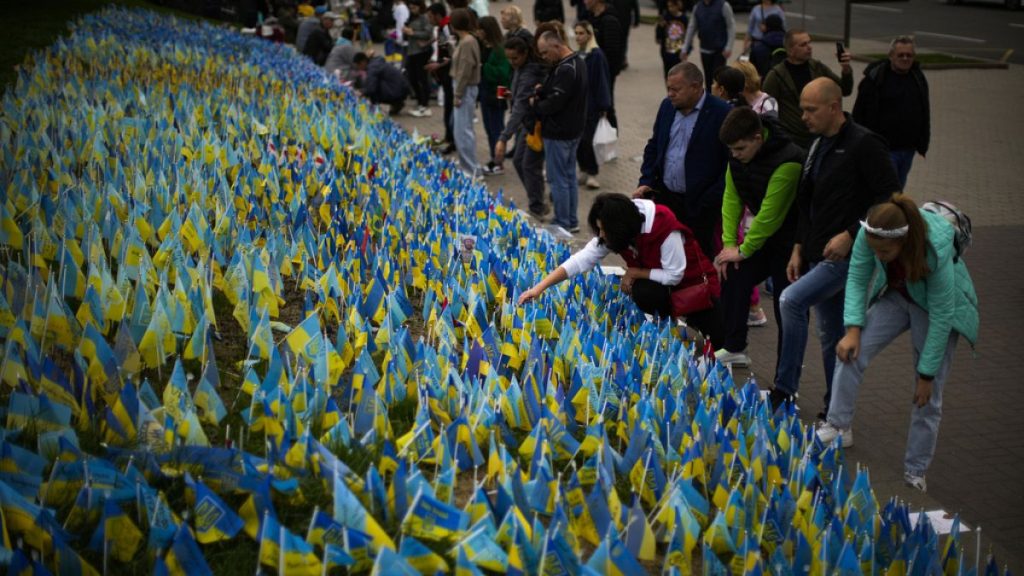Here are the 15 films you need to see at this year’s LFF – from future Oscar hopefuls to powerful protest films and absurdist comedies, there’s truly something for everyone in this 68th edition’s vibrant line-up.
The UK’s most prestigious film festival returns next month, and this year’s 68th edition of the BFI London Film Festival (LFF) features an impressive line-up.
During the festival’s 11 days, from 9 to 20 October, audiences will be treated to more than 110 films – starting with the premiere of Steve McQueen’s Blitz on the opening night, continuing with some eagerly anticipated titles like Palestinian filmmaker Laila Abbas’ Thank You For Banking With Us and Irish director Darren Thornton’s comedy-drama Four Mothers, before ending with Pharrell Williams doc Piece by Piece.
A lot of the films that have previously premiered in Berlin, Cannes, Venice and Toronto, and there are a handful of world premieres to keep things lively.
It’s a pretty huge selection of films to get through – without taking into consideration the numerous Screen Talks with the likes of Steve McQueen, Zoe Saldaña, Andrea Arnold, Lupita Nyong’o and Mike Leigh, to name but a few.
So, considering we’ve been lucky enough to attend several film festivals this year and have seen significant chunks of the line-up, here are L’Observatoire de l’Europe Culture’s picks of some of the best films screening at this year’s LFF.
April (Competition)
Georgian director Dea Kulumbegashvili follows her stunning debut feature Beginning, which won San Sebastian’s Golden Shell for Best Film, with April. Brass tacks: It’s one of the most impactful films you’ll get to see at this year’s festival. It focuses on Nina (Ia Sukhitashvili), an obstetrician working in rural Georgia who performs clandestine abortions, despite the laws of the country which state that pregnancy terminations are only legal within the first 12 weeks. When a newborn dies in her care, an investigation begins and ramps up rumours about her morality and professionalism. What seems like a relatively straightforward story is given a tantalizingly challenging and at times surreal treatment, making this stunningly shot drama feel like a hallucinatory trip. It’s a tough watch as Kulumbegashvili’s unparalleled vision swallows you whole. But it’s also a strong candidate to succeed the likes of Ryusuke Hamaguchi’s Evil Does Not Exist and Marie Kreutzer’s Corsage as this year’s Competition winner. Read our full review.
On Becoming A Guinea Fowl (Competition)
Zambian-Welsh filmmaker Rungano Nyoni’s second feature after her stunning debut I Am Not A Witch is an atmospherically rich tale which starts with a woman named Shula (Susan Chardy), wearing a silver helmet and a superb jumpsuit that makes her look like Missy Elliott’s rightful heiress. She seems unfazed when she encounters the dead body of her ‘uncle’ on the side of the road – for reasons which become very clear. What follows is a surreal and bleakly humorous tale following how Shula deals with trauma and familial complicity; this in turn leads to an exploration into how silence in the name of protection must be shattered so that wrongful impunity may never thrive. On Becoming a Guinea Fowl is a thrilling and distinctive piece of work that shows beyond a doubt that Nyoni is already one of this generations most singular talents.
Anora (Headline Gala)
Sean Baker, the director of Tangerine, The Florida Project and Red Rocket, wowed Cannes this year with his kinetic New York City screwball comedy – a modern Cinderella story that doubles as a gut-punch tragedy about how those who society chooses to marginalize will always be set up to fail. Anorawon the Palme d’Or and showcases the many talents of Mikey Madison, who plays an exotic dancer who agrees to play escort to the spoilt son of a Russian oligarch (Mark Eydelshteyn). It’s a knockout performance within a hilarious and surprisingly touching thrill ride – one that stands as a contender for one of the best films of 2024. Make sure you nab a ticket for this one, as well as one for Sean Baker’s Screen Talk on 12 October. Read our full review.
Emilia Pérez (Headline Gala)
Another Cannes treat, courtesy of French director Jacques Audiard (A Prophet, Dheepan), Emilia Pérez is one of this year’s most audacious films. His Mexico-set gangster trans musical featuring gender transitioning, cartels, gorgeous choreographies and songs about vaginoplasty sounds nuts but plays out like a knowingly kitschy telenovela version of Sicario. It’s an enlivening swing for the fences, a well orchestrated folly with a fully realised vision that never plays it safe. The film won two Palmes this year on the Croisette (Jury Prize and Best Actress for the ensemble cast led by Zoe Saldaña, Selena Gomez and Karla Sofía Gascón, the latter becoming the first trans performer to take the award) and has recently been selected to represent France at next year’s Oscars in the Best International Film selection. Don’t miss out – we’ve got high hopes it’ll win the Golden Baldie. Read our full review.
The Room Next Door (Headline Gala)
Based on Sigrid Nunez’s 2020 novel “What Are You Going Through”, Pedro Almodóvar’s first feature film in English recently won Venice’s Golden Lion and features two excellent performances from Julianne Moore and Tilda Swinton, who play estranged friends who reconnect when one of them is diagnosed with a terminal illness. While the Spanish director’s latest fails to sit alongside All About My Mother, Talk To Her or The Skin I Live In as one of his very best, it remains a touching tale of female friendship and a fascinating exploration into the western world’s shortcomings when it comes to confronting death. It’s a humanist film about life and reconciliation rather than a political one – even if it is, by the director’s own admission, pro-euthanasia. Expect big things at the upcoming awards season. Read our full review.
Bird (Headline Gala)
Andrea Arnold’s new film, which premiered in Cannes, is something of a departure for the filmmaker known for her social realism on screen. Fusing her usual style with a solid dose of magical realism, the director of Fish Tank and American Honey tells a harsh yet uplifting tale that will leave you ready to take flight. Teaming up with the ubiquitous Barry Keoghan and Franz Rogowski, as well as newcomer Nykiya Adams, Arnold crafts a coming-of-age tale with a palpable melancholy and darkness throughout. Her depiction of marginalized existences in broken Britain works, but more powerful is how she finds a unique space where feel-good emotions and broken dreams can coexist. Armed with a stunning collection of needle drops, Arnold’s direction and use of songs reveal this poignant film about metamorphosis in all its forms to be about finding hope in everyday turmoil. It’s magic. Read our full review.
The Seed of the Sacred Fig (Special Presentation)
Dissident Iranian filmmaker Mohammad Rasoulof clandestinely fled Iran two weeks before the premiere of The Seed of the Sacred Fig on the Croisette this year. He did so after receiving an eight-year prison sentence from the Islamic Republic for standing up to the brutal theocratic regime that he targets in this outspoken film. It examines Iran’s contemporary tensions through a family’s internalization of present turmoil. Set during the 2022 protests sparked by Mahsa Amini’s death, his thriller-infused allegory follows a family whose members double as cyphers of Iranian society. Rasoulof escalates things from a claustrophobic domestic huis-clos into a thrilling psychodrama with shades of horror, and it all works in unison to create a powerful cry of protest. Rasoulof’s film won the Special Award of the Jury in Cannes, as well as the Fipersci Award, and it was recently announced that the film will represent Germany at the 97th Academy Awards in the category for Best International Feature Film. You do well to not skip this excellent film, and to celebrate how fortunate we are to have filmmakers who dare to use their art to challenge oppression, misogyny and tyranny. Read our full review.
Queer (Special Presentation)
Let Luca Guadagnino transport you to Mexico City in the 1940s with his and Challengers writer Justin Kuritzkes’ adaptation of William S. Burroughs’ semi-autobiographical novel. Daniel Craig stars as William Lee, an awkwardly grandiloquent American expat who becomes infatuated with an elusive younger man (Drew Starkey). When the aging gay man asks the object of his affections to travel to deepest South America to discover a psychedelic drug called ‘yage’ (ayahuasca), the film turns away from a sweaty push-and-pull relationship and morphs into a fascinating Orphean retelling about the search for oneself, the yearning for self-acceptance, and the impossibility of going back to past glory days. If you can get tickets, you’re in for quite the sensual trip. Read our full review.
All We Imagine As Light (Special Presentation)
All We Imagine As Light was the first Indian film to play in Cannes Competition in 30 years. Director Payal Kapadia’s immersive Cannes Grand Prix-winning drama depicts how the lives of three women intersect in a second feature film that shows the daily hardships facing working-class women in Mumbai. On the surface, it’s a tale dealing with love and relationships; but as the runtime progresses, unexpected surreal elements are injected and break the verité style. The compassionate ode to friendship and female solidarity becomes a uniquely haunting and deeply humanist meditation on belonging and the dislocations inherent to life. The fact that India passed on the opportunity to send it to the Oscars next year is quite the misfire.
Ainda Estou Aqui (I’m Still Here) (Special Presentation)
After a 12-year absence from the big screen, you’d do well to celebrate the return of Brazilian filmmaker Walter Salles (Central Station, The Motorcycle Diaries) by booking a ticket for I’m Still Here. This fact-based story of desaparecidos during military-ruled Brazil in the 70s, told from the perspective of those left behind, is incredibly moving. Fernada Torres gives a terrific performance as a wife and mother who attempts to keep her family together when her husband is arbitrarily arrested and ‘disappeared’ by the government. It’s a no-frills drama that is subtly gripping without toppling into melodrama. A truly engrossing watch.
2073 (Debate)
Screening as part of the festival’s Debate section, Asif Kapadia (Senna, Amy) delivers a genre-bending documentary hybrid set in a fictional dystopian future which tackles the biggest challenges endangering our present. Broadly inspired by Chris Marker’s 1962 short film La Jetée – which also inspired Terry Gilliam’s 12 Monkeys – this urgent cautionary tale features contemporary news footage interspersed with interviews and a depressingly familiar rogues gallery (Donald Trump, Vladimir Putin, Nigel Farage, Viktor Orbán, Elon Musk) to illustrate not only the disruption of democracy but that it’s not about facts anymore. It’s about emotions and the distortion of a shared reality. Essentially a time capsule sent from the future, 2073 serves as a warning and a way for us to recognize our already triggered downfall before it’s too late. Hardly an easy watch or an exercise in subtlety – but that’s precisely the point. Read our full review – and stay tuned to L’Observatoire de l’Europe Culture for our interview with Asif Kapadia.
Grand Tour (Love)
Portuguese director Miguel Gomes (Tabu, Arabian Nights) left Cannes this year with the Best Director Palme under his arm for his work on this era-spanning, continent-crossing travelogue. Appropriately screening in LFF’s Love section, the film starts in 1918 and charts how Edward, a British diplomat, loves his fiancé Molly but seems pathologically commitment phobic. Every time they seem to be reunited, he darts off to another location in East Asia, leaving his determined lover to follow him – comically armed with unshakable purpose. From the performances to Gomes’ use of comedy and contemporary documentary footage to instill a dreamlike dirge in which past and present blur, this postmodern fable requires patience but yields beguiling results. And massive plaudits to the achingly beautiful inclusion of Bobby Darin’s ‘Beyond The Sea’ at the end…
Architecton (Thrill)
A standout from this year’s Berlinale, Architecton may sound like a Transformers reject and hard work. It is ponderously billed as a “journey into the realm of materials from which human dwellings are made: concrete and its predecessor, stone”. Look beyond that, however, and it’s really worth your time. And the biggest screen you can find, to better appreciate its ultra-high frame rate and arresting imagery. Russian non-fiction director Victor Kossakovsky (Aquarela, Gunda) delivers a magnificently realised piece of meditative cinema about concrete and finding « a new idea of beauty ». As eye-roll inducing as this will sound, it’s not a film you watch but rather an immersive trip you experience. It takes the viewer from war-torn Ukraine to Turkey and Lebanon through jaw-dropping drone photography, as we get to observe the evolution of natural and manmade structures. It’s an intoxicating film built around the recurring metaphor of life cycles, and it… Well, it rocks. Read our full review.
Les Femmes au Balcon (The Balconettes) (Cult)
Co-written with Céline Sciamma (Portrait of a Lady on Fire, Petite Maman), Noémie Merlant writes, directs and stars in this deliriously full-on comedy-horror about Ruby (Souheila Yacoub), Nicole (Sandra Codreanu) and Élise (Merlant), three friends who end up an almighty (and bloody) pickle when they have to dispose of the body of an abuser they’ve accidentally killed. For her second time behind the camera after 2021’s Mi Lubita Mon Amour, Merlant delivers a gory, funny, feminist and chaotic film that is the perfect Midnight Movie. Granted, it gets a bit messy and overly didactic towards the end, becoming a #MeToo ghost story that needed to not spell things out so much. Still, it’s a fun time at the talkies and, with any luck, a future cult classic. LFF seems to think so – having programmed it in their Cult section.
Rumours (Laugh)
Canada’s go-to experimental director Guy Maddin teamed up with his regular collaborators Evan Johnson and Galen Johnson once more to deliver a wonderfully silly and star-heavy (Cate Blanchett, Charles Dance, Denis Ménochet, Nikki Amuka-Bird, Alicia Vikander) satire that will deliver some welcome giggles after the heavier fare on LFF’s line-up. Rumours follows ludicrously inefficient G7 leaders (so, G7 leaders) who attend a political summit to draft a joint statement on a global crisis. They are so consumed by their meaningless corporate-speak and empty pontification that they don’t realise the apocalypse has hit. They get lost in a German forest, and things get progressively weirder from there… It’s a Buñuelian farce with heavy doses of Dawn of the Dead, a sharply scripted lampoon that runs out of steam towards the end and could have been significantly stronger with 20 minutes less. However, it works as both an absurdist comedy and a reminder that ineffectual global leaders who attempt to dupe the world into believing that they’re indispensable through dollops of vacant psychobabble will lead the world to a swift and sniveling conclusion.
BFI London Film Festival takes place from 9 – 20 October. Check out the full programme and dates / times here.


















